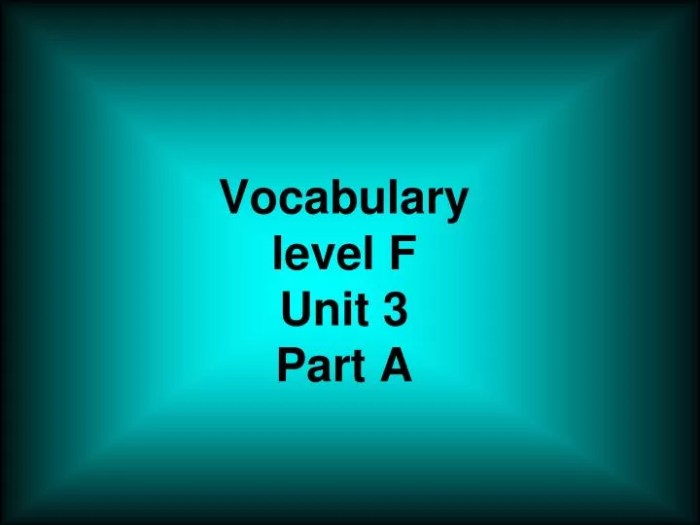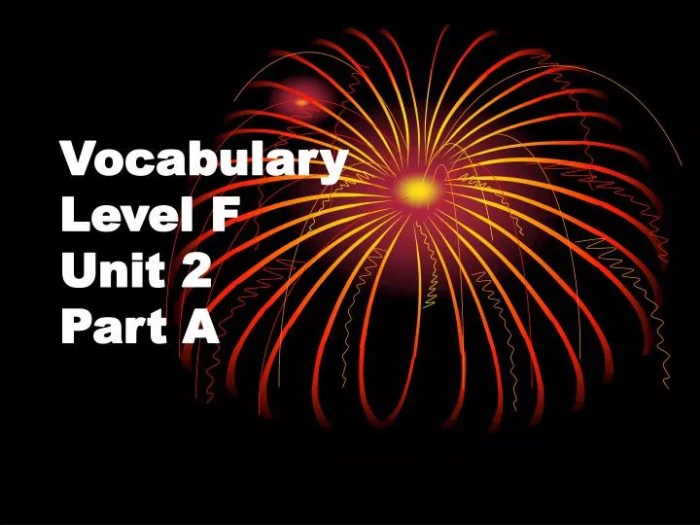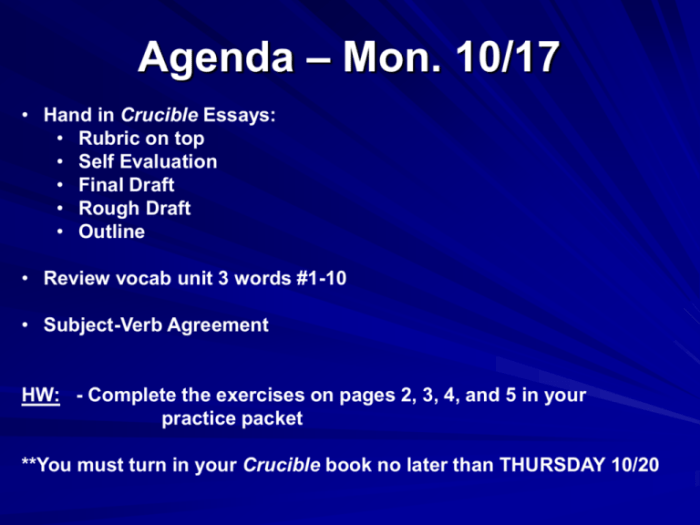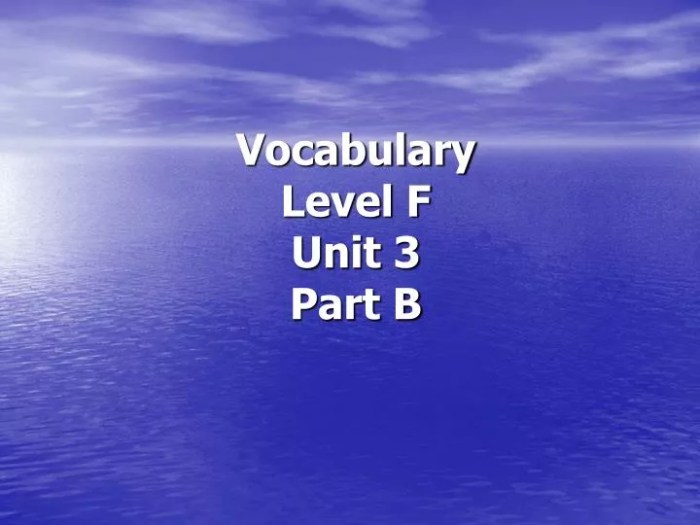Embark on a linguistic adventure with Vocabulary Level F Unit 3! This unit unveils a treasure trove of new words, inviting you to expand your vocabulary and conquer the nuances of language. Prepare to delve into the etymology, usage, and strategies for mastering these essential words.
Get ready to dissect word origins, explore contextual meanings, and discover proven techniques for vocabulary acquisition. Whether you’re a language enthusiast or simply seeking to enhance your communication skills, Vocabulary Level F Unit 3 is your guide to linguistic mastery.
Vocabulary List and Definitions

Unit 3 of Vocabulary Level F introduces a range of new words that expand your vocabulary and enhance your ability to express yourself effectively. These words cover various topics, from emotions and relationships to personal qualities and abstract concepts.
Emotions and Relationships
- Affection: A feeling of fondness or liking for someone or something.
- Empathy: The ability to understand and share the feelings of another person.
- Intimacy: A close and personal relationship between two or more people.
- Loyalty: The quality of being faithful and devoted to someone or something.
- Passion: A strong and intense emotion, often involving love or desire.
Personal Qualities
- Courage: The ability to face danger or difficulty without fear.
- Creativity: The ability to produce original and innovative ideas.
- Honesty: The quality of being truthful and sincere.
- Humility: The quality of being modest and not arrogant.
- Integrity: The quality of being honest and having strong moral principles.
Abstract Concepts
- Ambition: A strong desire to achieve something.
- Belief: A conviction that something is true.
- Hope: A feeling of optimism and expectation for a positive outcome.
- Meaning: The significance or purpose of something.
- Truth: That which is true or in accordance with reality.
By incorporating these words into your vocabulary, you can express yourself more precisely and effectively, enhancing your communication skills and enriching your understanding of the world around you.
Usage and Context: Vocabulary Level F Unit 3

In this section, we’ll delve into the practical usage of vocabulary words in context. We’ll explore sentences and paragraphs that showcase their meanings and provide examples from the unit and beyond.
Demonstrating Usage
- Abhor: “I utterly abhor violence in any form.”
- Fervent: “He was a fervent supporter of the revolution.”
- Gregarious: “She is a gregarious person who enjoys being around others.”
- Lethargy: “After a long day, I succumb to a state of lethargy.”
- Meticulous: “She is meticulous in her work, ensuring every detail is perfect.”
Word Analysis

Word analysis involves examining the etymology, root words, and structure of vocabulary terms to uncover their meanings and relationships. By understanding the origins and components of words, we gain a deeper comprehension of their usage and significance.
Etymological analysis traces the historical development of words, revealing their origins in different languages and cultures. Root words, the fundamental building blocks of words, provide insights into the core meaning and relationships between terms.
Prefixes and Suffixes
Prefixes and suffixes are word parts that attach to the beginning or end of root words, respectively. They modify the meaning or part of speech of the base word. For example, the prefix “un-” typically indicates negation or reversal, as in “unhappy” or “untie.”
The suffix “-tion” often forms nouns from verbs, such as “education” from “educate.”
Word Families
Word families consist of words that share a common root and have related meanings. By identifying word families, we can expand our vocabulary and improve our understanding of word usage. For instance, the root “chron” in “chronology,” “chronic,” and “chronometer” conveys the concept of time.
Vocabulary Acquisition Strategies

Enhancing your vocabulary is a fundamental aspect of language learning. Acquiring new words empowers you to express yourself more precisely and comprehend a wider range of texts and conversations.
As we delve deeper into Vocabulary Level F Unit 3, we explore various ownership structures. One intriguing concept is owning horses in an LLC . Understanding such real-world applications of legal entities enriches our vocabulary and enhances our ability to navigate complex legal scenarios.
Vocabulary Level F Unit 3 continues to provide invaluable insights into the nuances of ownership and legal structures.
To effectively acquire new vocabulary, various strategies can be employed. These include techniques for memorization, repetition, and spaced retrieval.
Flashcards
Flashcards are a classic tool for vocabulary acquisition. Each card features a word or phrase on one side and its definition or translation on the other. By regularly reviewing these cards, you can reinforce your memory and improve your recall.
Word Lists, Vocabulary level f unit 3
Creating word lists can be a helpful way to organize and track your vocabulary progress. Group words by topic or difficulty level, and review them regularly to reinforce your learning.
Spaced Retrieval
Spaced retrieval involves reviewing new words at increasing intervals. This technique helps strengthen your memory by forcing your brain to recall information over time. You can use flashcards or spaced repetition software to implement this strategy.
Vocabulary Assessment

Assessing vocabulary comprehension is crucial to evaluate students’ understanding of new words and their ability to apply them in different contexts. Here are some methods and criteria for assessing vocabulary comprehension:
Quiz or Test
Create a quiz or test that includes the following question types:
- Multiple choice:Provide multiple options for the definition of a word.
- Fill in the blank:Use incomplete sentences where students need to fill in the correct vocabulary word.
- Short answer:Ask students to define a word or provide an example of its usage.
- Sentence completion:Provide a sentence with a missing word and ask students to choose the correct option from a list.
Criteria for Evaluation
Establish clear criteria for evaluating student performance:
- Accuracy:The number of correct answers out of the total number of questions.
- Comprehension:The quality of the definitions or examples provided by students.
- Application:The ability to use the words correctly in different contexts.
By using these assessment methods and criteria, educators can effectively gauge students’ vocabulary comprehension and provide targeted support to improve their language skills.
Essential Questionnaire
What is the most effective way to memorize new vocabulary?
Repetition and spaced retrieval are key. Review new words regularly, increasing the time intervals between reviews to enhance long-term retention.
How can I improve my vocabulary in context?
Read widely and pay attention to how words are used in different contexts. Note down unfamiliar words and explore their usage in sentences or paragraphs.
What are some tips for analyzing word etymology?
Break down words into their root words and prefixes/suffixes. Research the origins and meanings of these components to gain a deeper understanding of the word’s evolution.